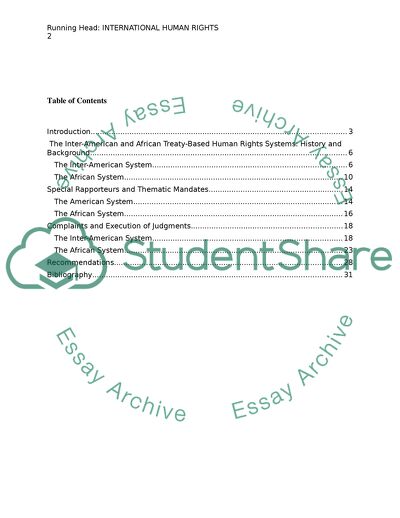
- Home
- Free Samples
- Premium Essays
- Editing Services
- Extra Tools
- Essay Writing Help
- About Us
- Studentshare
- Subjects
- Law
- The Experiences of the Inter-American and African Treaty Based Human Rights
The Experiences of the Inter-American and African Treaty Based Human Rights - Essay Example

- Subject: Law
- Type: Essay
- Level: Undergraduate
- Pages: 25 (6250 words)
- Downloads: 0
- Author: eusebioupton
Extract of sample "The Experiences of the Inter-American and African Treaty Based Human Rights"
When a state signs a human rights treaty, they are agreeing to the provisions of the treaty and this includes legal limitations on how they treat private parties within their states. However, the treaty and quite often some provisions within the treaty require ratification in order to be binding. In developing its international human rights system, the United Nations (UN) encourages regional human rights treaties as a means of complementing and enforcing universal human rights norms.3 Regional human rights treaties can be advantageous to international treaties because states within the region will usually have the incentive to promote and protect human rights to ensure stability in the region. Moreover, states within a region usually share political and cultural values and will often agree on the appropriate human rights norms.
4 What makes these treaties unique is that they do not regulate relations between the member states, but rather bind member states to a standard of human rights treatment in relation to their citizens. In doing so, citizens and other private parties may seek to enforce member states human rights obligations under these treaties.5 Neumayer argues however, that when a state signs a human rights treaty, it may be nothing more than an ‘expressive’ gesture or rather, a disingenuous signal that the state is committed to respecting human rights.
6 On the other hand, states may also take their commitments seriously as a result of the external pressure that usually accompanies the signing of a human rights treaty.7 In order for human rights treaties to effectively protect and promote human rights, they must be accompanied by a complaints and response system permitting effective remedies in respect of ‘human rights violation’.8 There are currently 21 states bound by the decisions of the Inter-American Court of Human Rights, 47 are bound to the European Court of Human Rights, and 24 African Union states are bound by the African Court on Human and Peoples’ Rights.
9 The increasing number of state signatories to regional human rights treaties and submission to their courts suggest that there is a strengthening of the international human rights regime.
...Download file to see next pages Read MoreCHECK THESE SAMPLES OF The Experiences of the Inter-American and African Treaty Based Human Rights
Slavery in Colonial Latin America
Changing social and legal dimensions of race relations in The US from 1920-1950
International Human Rights: Race Discrimination
Human Rights Systems Issues
Early African History
The Souls of Black Folk by W. E. B. Du Bois
African American History
The European Union Ideals in Relation to the International Relationship

- TERMS & CONDITIONS
- PRIVACY POLICY
- COOKIES POLICY